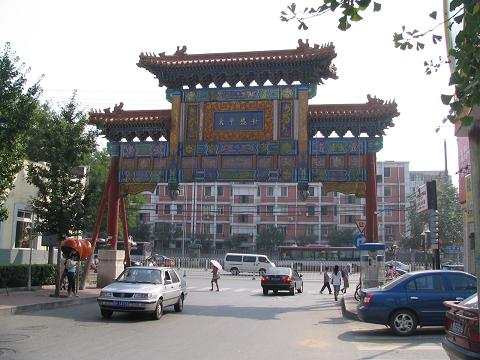Random thoughts, China, Ayn Rand, and Virtues
 Hey it's me. I was downstairs doing some exercises in the courtyard of the apartment complex when I was approached by a Chinese guy. He chatted with me a bit and wanted to know if I was interested in doing work for TV, advertisements and the like. I heard that some people who work in this building are related to the marketing and entertainment industry, even the guy next door to me makes music for China Central TV. The guy that approached me wanted me to see his office, which I did. It looked professional and had tons and tons of peoples' pictures. We discussed some projects that needed foreigners. He said he had one right now where I would play the role of a doctor and check a patient. Well, I said I could do that. His partner was in the office and we discussed the pay, I wanted at least the minimum I make as an English teacher. At least I could try out the work and see what it was like. It helps to speak Chinese. It reminds me of my good friend Jason has been working as an extra in Hollywood for the past few months now. He has been in several prime time shows. I told him he could win an academy award for "Best Dramatic Presence" as "Man Walking Around". Honestly, it's quite amazing what he is doing nowadays. Working as a Hollywood extra, playing in a rock band as a drummer, writing short stories, and getting his Master's Degree to become a teacher. The subject his wants teach in History, and he has already passed the California State Teaching Exam to teach that subject, which required extensive and intensive study. What can I say, I'm proud to have him as a friend.
Hey it's me. I was downstairs doing some exercises in the courtyard of the apartment complex when I was approached by a Chinese guy. He chatted with me a bit and wanted to know if I was interested in doing work for TV, advertisements and the like. I heard that some people who work in this building are related to the marketing and entertainment industry, even the guy next door to me makes music for China Central TV. The guy that approached me wanted me to see his office, which I did. It looked professional and had tons and tons of peoples' pictures. We discussed some projects that needed foreigners. He said he had one right now where I would play the role of a doctor and check a patient. Well, I said I could do that. His partner was in the office and we discussed the pay, I wanted at least the minimum I make as an English teacher. At least I could try out the work and see what it was like. It helps to speak Chinese. It reminds me of my good friend Jason has been working as an extra in Hollywood for the past few months now. He has been in several prime time shows. I told him he could win an academy award for "Best Dramatic Presence" as "Man Walking Around". Honestly, it's quite amazing what he is doing nowadays. Working as a Hollywood extra, playing in a rock band as a drummer, writing short stories, and getting his Master's Degree to become a teacher. The subject his wants teach in History, and he has already passed the California State Teaching Exam to teach that subject, which required extensive and intensive study. What can I say, I'm proud to have him as a friend.I have been getting a lot of proofreading work lately. I have contacts with a couple of companies here. They pay 120 RMB ($15) for 1000 English words. In the just the past two weeks I have proofread about 10,000 words worth of documents. The good thing is my contacts pay right away and directly into my bank account. I think this could be another good business to get into if I can find other foreigners willing to work with me as proofreaders.
The Ayn Rand book, Atlas Shrugged is really long, over 1000 pages, and it has taken me months to get through it. But there is one important phrase which struck me profoundly.
Life is the reward of virtue. Happiness is the reward of life.
What I take this to mean is that it is our virtues are important in the quality of our lives and length of lour lives. Honesty, prudence, frugalness, compassion, etc. If we live in ways that are wicked, we put ourselves on the path to doom. This seems easy enough to understand, but I thought the above phrase really captured this and is easy to remember. Her definition of love I found to be very good too: To love is to value; love is the expression of one's values.
From what I havv read about the subjects, logic and Buddhism seem somewhat opposed. In Buddhism compassion is the most valued attribute. While logic is a ruthlessness discipline that prohibits leniency on evidence and demands you look at the facts. If you have read anything about Buddhism you find that logic is thrown out the window, and seeks to help you escape this universe of cause and effect. Logic says everything has a cause and to turn away from seeking the truth and seeing reality is to damn your mind to oblivion.
China seems to have been torn in several directions during its cultural history, influenced by Confucianism, Buddhism, Daoism, and others. I think China today is looking to the West for guidance but trying to maintain its own cultural identity. The giant stone in front of Renmin University has a Chinese saying which can be translated to “Pursue the facts.” You many know that Chinese have many varied and long standing belief systems. I hear some people call some of these beliefs superstitious and out-of-date. This “Pursue the facts” reflects the schools aims to dispel superstitions and modernize the country. I might take it a step further and say that technology and capitalism are today’s religion in China. But I also see people trying to hold on to their traditional roots such as keeping close family ties. Imagine a city of bicycles transforming into a city of cars in 15 years. Change has come on fast.
Labels: China, Xiaoxitian



